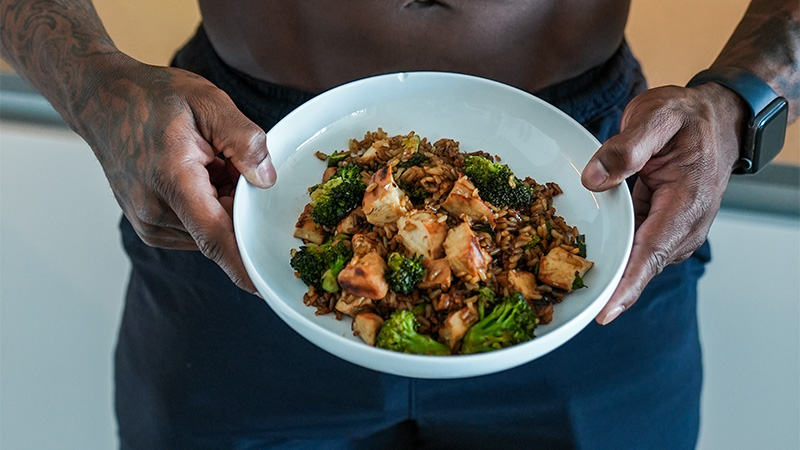Curb your appetite, kick those cravings, get better portion control – when it comes to your appetite, it seems most everything is about suppressing it.
We hear all the time about models and actors starving themselves, or how eating less helped some celebrity get bathing suit ready, or even how your neighbor basically lived on nothing more than a few leaves of kale for days, and now they look fabulous (which, let’s be honest, is pure, unhealthy BS).
You want some honesty? Hearing your stomach growling and other signs of hunger are good things! That means you have a healthy appetite.
In a world where obesity rates keep going up, that might not seem like a big deal. However, it actually can be. Your appetite can rise and fall for several reasons, including your diet and activity level, stress, illness, and medications.
And not having an appetite can be a sign of something seriously wrong, or at the very least, a sign of you not being healthy. And since we want you healthy in every way, let’s take a little bit to discuss five ways to ensure you always have a healthy appetite.
- Get more exercise
This one’s obvious. If you burn more calories, your body needs to replenish that fuel and make up for it, which stimulates your appetite, making you feel hungrier.
After a rigorous workout, you probably won’t immediately feel hungry. Why is that? Well, when your body temperature rises while exercising, your brain signals thermoreceptors to reduce your appetite.
Basically, as long as you’re sweating it out in the gym, you won’t hear your stomach rumbling. It’s only once you’ve cooled down and your body has regulated its temperature that you’ll feel ready for a meal.
- Eat three meals a day
“Breakfast is the most important meal of the day.” We’ve all heard the mantra.
Whether it’s actually true or not, you still need to eat breakfast, lunch, and dinner, although breakfast is especially important. Skipping breakfast means eating less throughout the day, which is the opposite of what you want.
Not only will eating breakfast get you to satiate your hunger in the morning, but it’ll also help you burn calories throughout the day.
The key is thermogenesis, which is your body’s way of producing heat. As you eat and intake calories, your body is spending some of those calories on heat production. According to a study published in the Journal of Clinical Endocrinology and Metabolism, the body may produce a stronger thermogenic reaction in the morning. So those who eat breakfast will end up burning more calories than those who don’t.
Plus, burning calories in the morning means you’ll have room for lunch and dinner throughout the day. More importantly, you’ll actually be hungry for lunch and dinner.
- Eat smaller, more frequent meals
If you really can’t commit to three full meals a day, eat more often.
It sounds counterintuitive, I know, but not everyone can eat a full breakfast. And lunch breaks often get cut short.
That’s where eating smaller, yet healthy meals throughout the day can help fuel your body throughout the day.
Eating four, five, or even six small meals or healthy snacks throughout the day will help stabilize and satisfy your appetite, especially if you aren’t eating a lot during regular meals. It’ll also create a quicker, more efficient metabolism, so you’ll feel energized all day. A fast metabolism will generally burn more calories during exercise and rest periods, which means you’ll probably feel hungrier more often.
- Schedule your meal times
If you just don’t feel hungry during the day, knowing when to eat takes some extra work, but you can train your appetite.
It’s like training your dog. When your dog does the right trick, it gets a treat. So, when your body sends hunger signals, you give it food. Simple, right? Not always, especially if you don’t feel the normal hunger cues.
If that’s the case, schedule your meals for the same times every day. Being consistent will help your body know when to expect meals — and when to be hungry for them.
- Take your vitamins and supplements
Having a reduced appetite might not be your fault. Well, not completely your fault, anyway.
If you have a deficiency of certain vitamins or minerals, your body will react by reducing your appetite. Fortunately, making sure you get the right vitamins and supplements to increase your appetite is as easy as stopping by your local pharmacy.
Zinc, fish oil, thiamine, and echinacea are all vitamins and minerals that your body already needs. They also boost your appetite.
Chances are, if you’re not eating enough or you’re not eating enough of the right foods, you could have a mineral deficiency, which will seriously reduce your appetite.
Make sure you’re eating a balanced diet, and you shouldn’t have to worry about a vitamin or mineral deficiency.
- The Role Nutrition Plays in Maintaining a Healthy Thyroid - July 25, 2024
- Balancing Hormones With Diet - July 11, 2024
- Chapados’ Top 5 Glute Exercises - May 8, 2024
- The Role Nutrition Plays in Maintaining a Healthy Thyroid - July 25, 2024
- Balancing Hormones With Diet - July 11, 2024
- Chapados’ Top 5 Glute Exercises - May 8, 2024








